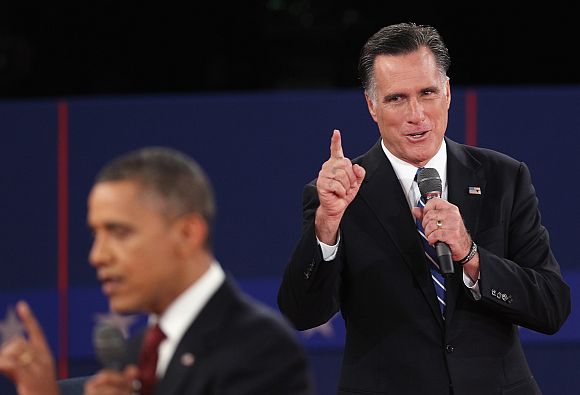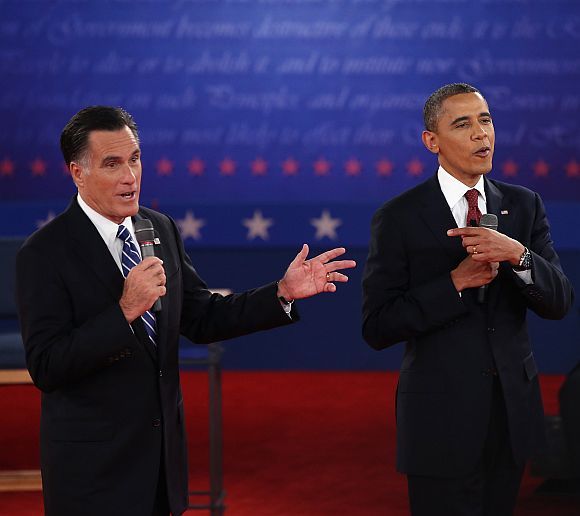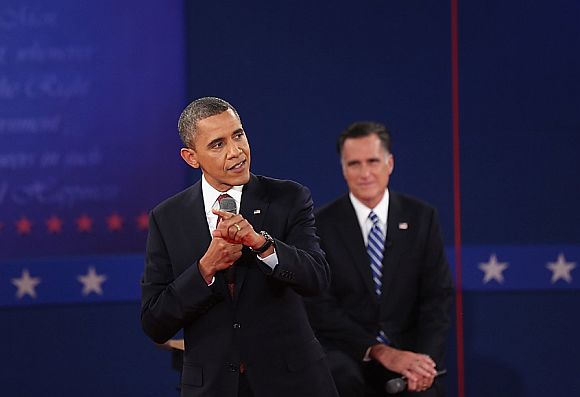
Aziz Haniffa analyses how President Barack Obama took the fight to his opponent Republican nominee Mitt Romney in the thrilling second presidential debate at New York's Hofstra University
When President Barack Obama's closest advisers said he would come out swinging in his re-match with Republican presidential nominee Mitt Romney after he lost badly on points in the first round following a listless and lack-lustre performance, they weren't kidding.
Obviously the three days of closeted strategy sessions in a Williamburg, VA golf resort, where he watched videos of his dismal performance in the first debate and prepped intensely with the likes of Senator John F Kerry -- once again playing Romney -- and other senior aides, worked, much to the elation of his Democratic base that has been despondent ever since Round One and were thrilled by his aggressive and passionate come-back in the amano-amano slugfest.
There was no knock-out this time either -- like in the second Muhammed Ali-Joe Frazier rematch -- and the town-hall format did exactly lend itself to such a victory, but it did allow for counter-punching, which Obama did with gusto, coming out of his corner to take the fight to his opponent and doing away with the rope-a-dope tactics that was his downfall in the first debate.
...

Like Ali in that second fight, Obama was on the attack from the get-go and even one of his fiercest critics, conservative columnist and the Fox News Channel analyst Charles Krauthhammer also agreed with Democrats that Romney had several openings which he missed and made tactical errors, which helped Obama to counter-punch and "on points, Obama came out ahead."
The first scientific poll results of registered voters conducted by CNN, immediately after the debate, had Obama winning by 46 per cent over Romney, who garnered 39 per cent, unlike the almost three-to-one points victory he recorded in the first debate, which gave him such a bounce in the polls and energised the Republicans who had all but given him up for dead.
But this time, Obama got in all of the zingers that the Democrats had hoped he would have clobbered Romney with in the first debate, from the 47 per cent controversial faux pas at a closed-door fund-raiser with high-roller donors which was secretly videotaped and which the Obama campaign filled the airwaves with a plethora of negative ads saying that Romney did not care about the middle-class of poor and had virtually written off almost half of the electorate to ridiculing Romney's assertions that he would be tough on China, calling him a leading pioneer of outsourcing, and also pointing to Romney's allegedly extreme positions on immigration as well as on social issues, including on gender issues -- basically calling him the quintessential flip-flopper.
...

This is not to say Romney didn't have his moments, and did score with some jabs, saying Obama hadn't kept the promises made during his campaign and then during fours years of his presidential tenure, rattling off a litany of pledges the President had failed to deliver on.
And, he kept coming back to these failed promises over and over again like a repeating groove pointing to the dismal state of the country's economic situation with more people unemployed, more people on food stamps since Obama's advent.
But on the all-important foreign policy fiasco in the US consulate in Libya where four Americans were murdered, including Ambassador Chris Stevens which the Republicans had been salivating to slam Obama on for the differing narratives and for not acting on requests for more security at the consulate, Romney stumbled and misreported what Obama had said the day after the tragedy.
Even though Obama avoided answering the specific question of why the security was not beefed up in the consulate and instead launched into a soliloquy about how he felt for Stevens and the others killed, Romney instead of seizing on this opportunity to land a body blow, said, Obama had not called it a terrorist attack till more than a week after the horrific incident, when Obama had indeed said so in the Rose Garden the next day that "no acts of terror will ever shake the resolve of this great nation, alter that character, or eclipse the light of the values that we stand for."
...

Romney continued to contend that Obama had not called it an act of terror and had to be fact-checked by the moderator, CNN's Candy Crowley who said Obama had described it as such, even though she also acknowledged that it had taken more than five days for the Obama administration to say there was no demonstration ignited by the YouTube video defaming Prophet Muhammad and that it was a pre-meditated act of terrorism.
Here Romney seemed like a deer caught in the head-lights and clearly failed to capitalize on the sloppiness of the administration officials who were on the defensive along with the Democratic leadership arguing that Romney and the GOP were politicizing a tragedy instead of coming together in a sense of national unity as Americans always do in cases like this.
In what was perhaps the most dramatic moments of the debate, Obama was also visibly angry on this Benghazi back and forth -- which the GOP had dubbed Benghazigate and even declared it was worse that the Watergate scandal because during that cover-up by President Nixon, for all the lies nobody had died -- when Romney seemed to challenge his integrity and that of his senior cabinet officials.
"The suggestion that anybody in my team, whether the Secretary of State(Hillary Clinton) or UN Ambassador (Susan Rice, who in several talk shows had initially said the Benghazi incident was a reaction to the YouTube video) -- anybody on my team -- would play politics or mislead, when we've lost four of our own government, is offensive."
...

Obama thundered, "That's not what we do, that's not what I do as President, that's not what I do as Commander-in-Chief."
Earlier, even though Clinton had provided him cover by taking responsibility for the tragedy, telling CNN in an interview with CNN while visiting Peru that she takes responsibility and arguing that the President or Vice President had no way of being aware of the specifics of diplomatic security, which was a State Department function,
Obama asserted that the buck stops with him.
"The Secretary has done an extraordinary job, but she works for me," he said, declaring that ultimately the responsibility lies with him.
David Gergen, professor of public policy at the Harvard School of Government and former aide to six presidents, who is now also an analyst with CNN, and considered the guru of all pundits, said, "President Obama did exactly what a lot of Democrats have wanted him to do for a long time -- to punch back and point out the holes and to go through those holes. And, I thought he did that very effectively. He was on top of his game."
He said, "The President did well enough to blunt Romney's momentum," although he predicted that "it's a horse-race to the end."
...

Alex Castellanos, a much respected GOP analyst, also agreed, acknowledging that "I thought Mitt Romney was not as strong on a lot of the debate as President Obama was -- who was in control."
The President's sparring partner, Kerry, was all over the spin-room after the debate, joyously declaring how "the President overwhelmed Mitt Romney tonight with facts and with a vision for the future."
In the final analysis, both candidates clearly satisfied their respective bases, but whether they moved the needle even every so slightly at the thin slice of the undecided and uncommitted, was an open question.
At the end of the day, Obama, who under severe pressure had succeeded in his do-over that probably helped to stop the bleeding after his catastrophic inertia in the first round and helped him to maintain his wafer-thin lead in the battleground states, particularly Ohio, which Romney has to win if he's to become the new occupant of the White House.
Whether the debate on October 22, which will focus wholly on foreign policy will help the undecided make up their minds or whether these debates matter at all and the hype is over the top, is up for conjecture.